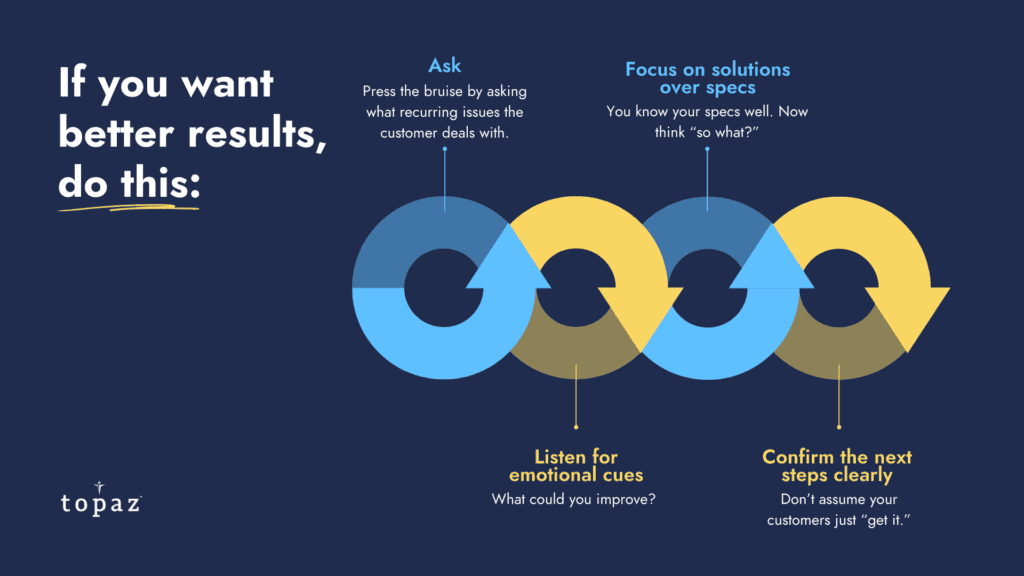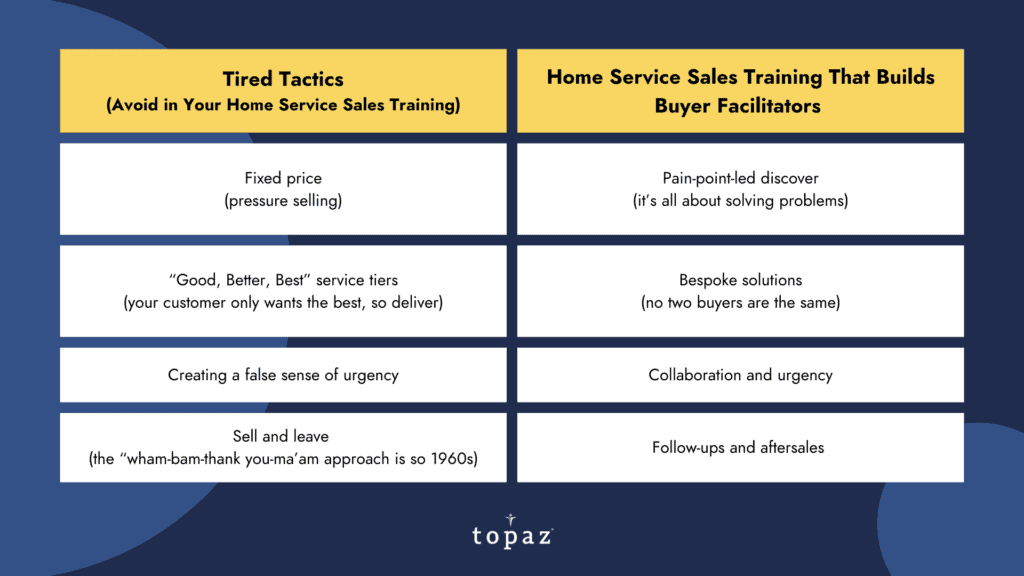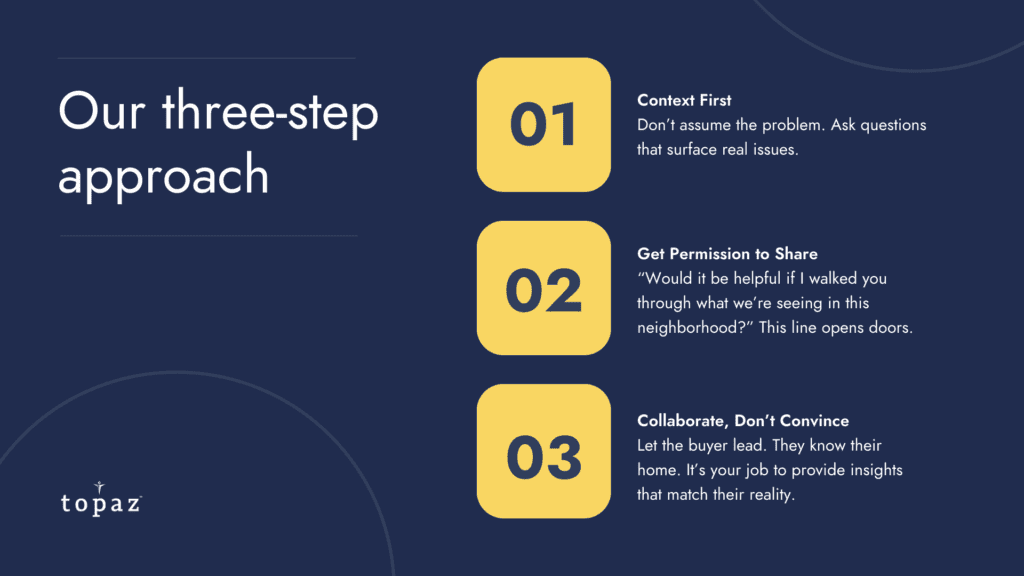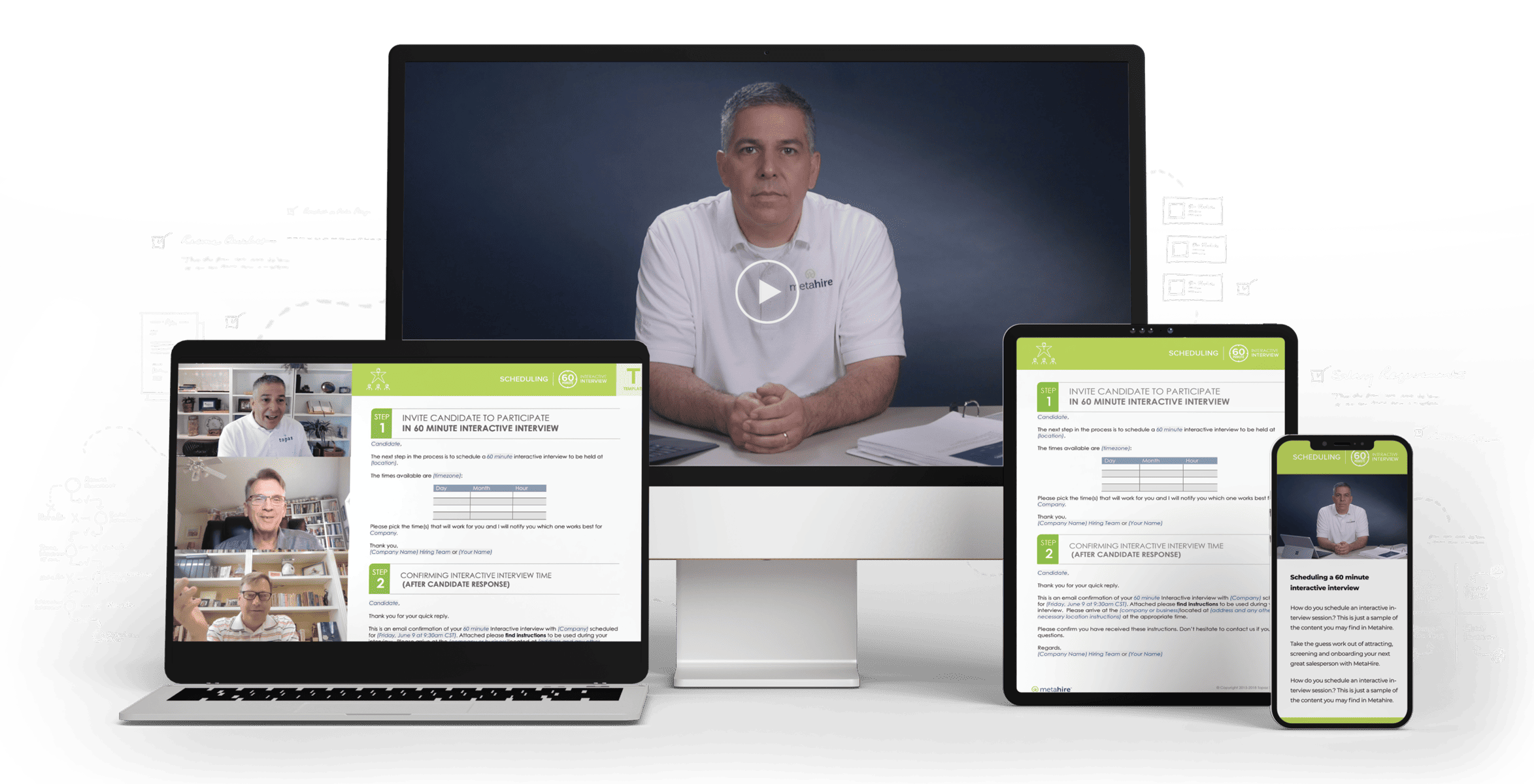Thinking about investing in home service sales training? Good, you found us. Now let’s talk about it.
High-pressure sales tactics might work for some quick wins, but they’re a disaster for big-ticket home services.
Tragically, many companies conduct their home service sales training without teaching these aspects. And nine times out of ten, their sales teams fall flat on their faces.
Does this need to happen to you? Do you need to fall flat on your face?
No — at least not if you infuse your home service sales training with our Buyer Facilitator approach.
Our philosophy takes the old home service sales training book and throws it in the paper shredder. More than a way to drum up business, it’s a way for your teams to act as problem solvers.
Learn more about turning sales teams into Buyer Facilitators with your home service sales training.
And by the way, we know that every industry is different, so we’re also throwing in some actionable tips for each one!
HVAC — Ditch the Feature Dump!
Imagine opening your door to an HVAC rep.
As you open the door, the rep makes an introduction and goes on a lenghty explanation about SEER ratings, airflow optimization, and something called “Energy Star.”
Leaving you with nothing but a brochure and a handshake, the rep is quick to leave.
What just happened?!
Did the rep just assume you’d buy after hearing an endless list of features? If they did, they already lost.
This is where home service sales training fails — “evangelizing” with the features.
Why Selling Features Doesn’t Work
Home service sales training for HVAC teams often teaches how to explain products, but there’s hardly anything about what matters, such as solving problems.
“But isn’t my team supposed to educate the buyer?” Yes, but there are layers to the “education” piece.
Here’s something nobody may have told you:
People don’t care about features. What they do care about is fixing what’s broken and going about their day. This is why your team should come off as understanding about what customers are going through. Listen, react, ask questions, and take action.
What Needs To Change

Electricians – The Jargon Trap
We see this one all the time:
An electrician shows up, rattles off a bunch of volts, amps, and panel specs, drops a quote, and bounces.
The homeowner’s nodding, smiling, and completely lost. And you know what happens next — the customer will “think about it” and then hire someone who actually listened to their concerns, uncovered pain, and made them feel in control.
What’s the takeaway here? Technical knowledge doesn’t close the deal. Connection, relationship-building, and clarity do.
Flip the Conversation
Instead of a whole engineering lecture, you should encourage your reps to ask questions. For example, a rep can ask a prospect “ever had your power trip for no reason?”
Now the homeowner’s talking, admitting nervousness about those flickering lights.
The rep listens, validates their concerns, and walks them through the panel upgrade using plain, relatable language.
Teach Reps to Speak Human
This is where home service sales training usually fails — it teaches electricians to explain and not to connect. Your sales team must mirror the buyer’s language and not show off their own. If you have a technically-oriented customer, great. Drop all your knowledge on them. But for the average consumer, you speak a completely different language if you only communicate as if you’re chatting with your other electrician colleagues.
Clarify, Don’t Complicate
The moment a homeowner feels confused, they check out. If they don’t understand the problem or solution, they’re not likely to buy anything you’re selling — period.
So, train your reps to educate and they’ll remove buyer overwhelm, then close a sale.
Roofing — The Trust Deficit
If there’s one home service where pressure-selling is the norm, it’s roofing. It should come as no surprise, then, that the classic sales tactics don’t often work in this industry, and that homeowners are more likely to trust word-of-mouth reviews.
You see, pressure-selling only makes things worse if your prospect is on the fence.
Luckily, strategies like those built into our Buyer Facilitator model do away with old sales tactics and use more customer-centric ones.

Pest Control – Stop the Script
Sometimes, it’s better to go off-script, and this is something that most pest control sales teams haven’t taken to heart yet.
Are scripts bad? No. But here’s the rub: they often reek of desperation.
Just imagine for a second — a rep knocks while dinner’s hot, rattles off the same neighborhood discount script, and hopes politeness turns into a sale.
It doesn’t.
Why?
Because the whole thing feels transactional. And it’s obvious the rep doesn’t care what the homeowner’s dealing with.
Guess what? If a homeowner has pest control issues, you need to figure out what those are before selling your services. Otherwise, why would someone want you to fumigate their home for no reason? Think about it.
The Fix: A Three-Step Conversation
Let’s imagine a different scenario.
The rep opens with, “Out of curiosity, have you noticed any ants or wasps around the base of your home this season?”
Guess what happens next? A conversation (not a done-to-death pitch) happens.
And if you want a template for your home service sales training, here’s our three-step approach:

The Buyer Facilitator Impact
Your job is to present a solution to a problem your prospect is facing. On that note, your home service sales training should teach your reps to earn the right to make a recommendation, not rush into one.
That’s how you build trust and protect your reps from slammed doors.
Plumbing — It’s Not Just About the Pipes!
We (and millions of homeowners) have heard the pitch before:
Clogged drain. Quick fix. Done Deal.
It’s simple, right? Wrong!
This is exactly how most plumbing reps leave cash and trust on the table.
The homeowner called about a clog, sure. But what the customer really needed was a guide who could spot the bigger issue. There are always opportunities to learn more about the homeowner, the home itself, and any past or current issues they’ve experienced related to plumbing.
Once you ask and understand, then you can upsell. And you should.
A Micro-Coaching Pearl of Wisdom From Us to You
If you’re offering plumbing, your home service sales training should teach reps to dig deeper. After all, not every job leads to an upsell, but every job should open the door to bigger conversations.
If your reps can spot patterns, they become more than plumbers — they become advisors. And advisors are more likely to close.
More importantly, advisors are considered confidants, friends, and customers’ “plumbing guy.” You want to be that person every single time an issue arises, otherwise they’re back to Yelp and Google looking for alternatives the next time they experience a problem.
Don’t Be the Plumbing Company That Only Fixes “Symptoms”
You don’t want to be the plumbing company homeowners remember as ineffective. To prevent this from happening, cultivate trust by looking into the deeper issue.
Doing this is as easy as starting a conversation. Ask questions like “Have you had this issue before?” or “Has anyone scoped the line recently?” or “How old are the pipes in your walls?” or “When’s the last time you had your water heater checked out to make sure it’s running properly?”
These questions uncover deeper problems that most reps never would enquire about.
Solar — From Skepticism to Solution
Are you training solar reps? There’s a good chance they love their slideshows.
These presentations will be filled with factoids like federal incentives, kilowatt savings, ROI projections. And your reps added all these in ready to impress.
However, the homeowner didn’t ask for a pitch deck. In fact, a larger percentage of homeowners aren’t sold on the idea of solar yet. But that doesn’t mean you to need to be in sell, sell, sell mode.
When your rep jumps straight to selling without listening, the answer’s almost always no.
You need to get buy-in first.
Understand the Doubt, Then Sell the Dream
Again, it’s all about solving a problem. And when you’re pitching solar installations, you need to ask some tough questions, like how much your prospect spends on electricity and what’s keeping them from considering solar panels.
What have they heard from their neighbors who have them installed already? What preconceived notions or false beliefs might they have?
From here, you can present your solar solution as an alternative, an upgrade, a lifestyle change, a cost-savings opportunity, a home upgrade for resale potential, or something else that really resolves that particular customer’s painpoints.
Turn Doubt Into a Decision
When selling solar panels and services, your job is to provide clarity so customers can make better decisions. On that note, you’ll have to ask about your prospect’s utility pains, long-term plans, and average bills.
Then present benefits like how solar panels can make homeowners eligible for specific tax incentives and even increase a property’s resale value.
When you do this, there’s no sales pitch. There’s a conversation that gives your customer a clear direction, the benefits of your solution, and options.
It may not lead to quick short-term gains, but when you help someone make the right decision — even if it’s not today — you earn the trust to win their business tomorrow.
The Key to Effective Home Service Sales Training: Problem Solving, Not Pitching

If you’ve made it this far, you’ll know that customers just want to be heard. And the failure to listen to prospects is a scenario we see day in and day out.
This is why your home service sales training needs to be customer-centric instead of focusing on product pitches. Effective home service sales training teaches your reps to be Buyer Facilitators who help customers.
Are you looking for home service sales training that actually works? Contact our team at Topaz so we can share success stories with home service companies that we’ve worked with directly. We’re here to help — don’t hesitate to lean on us for training your sales team.
FAQs
What’s the biggest mindset shift in the Buyer Facilitator model?
Stop trying to convince. Instead, start helping the buyer figure out what’s right for them — even if it’s not what you want to hear.
Does the Buyer Facilitator model work for different home services?
You bet!
We’ve worked with countless home service companies, and they’ve seen tangible results with our approach to home service sales training.
How can you train home service sales reps to sell without being too pushy?
We’ve found that what works best is to cultivate curiosity. If reps understand the full problem, they can offer a solution. This way, it’s problem-solving and not selling.
How does the Buyer Facilitator model improve customer relationships?
By prioritizing the customer’s needs and concerns, the Buyer Facilitator model establishes trust and fosters long-lasting relationships. This approach makes customers feel valued and understood, encouraging repeat business and referrals.
What are the long-term benefits of implementing the Buyer Facilitator model in home service sales?
The Buyer Facilitator model not only leads to increased close rates but also higher customer satisfaction and loyalty. This translates to sustainable business growth and a positive reputation in home service industries.







